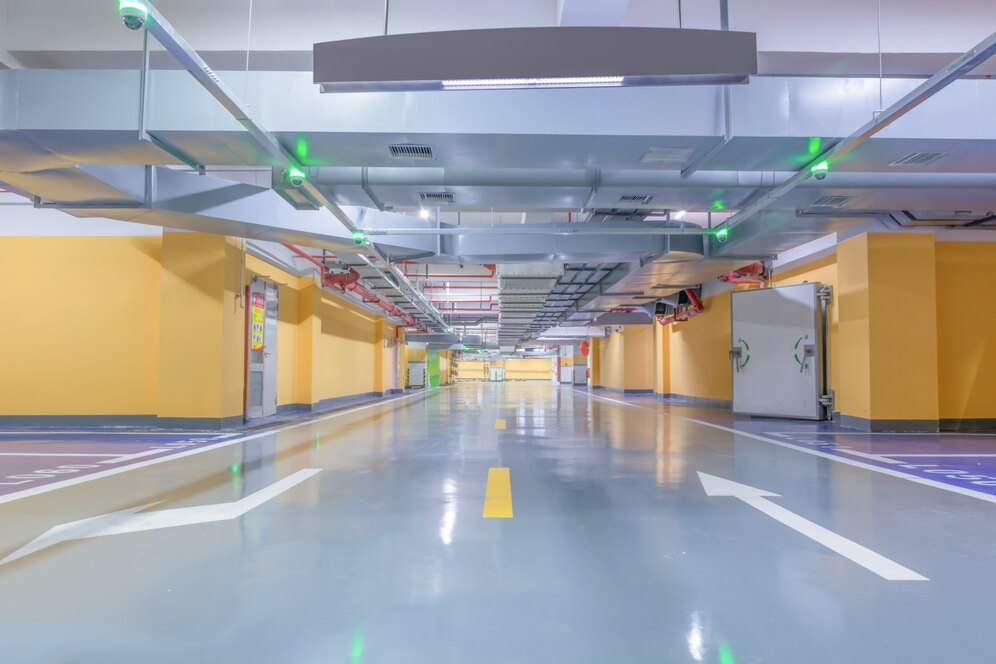In the realm of modern architecture and interior design, flooring serves as more than just a functional element—it’s a canvas for creativity and a foundation for durability. Commercial epoxy flooring has emerged as a versatile solution that combines robustness with aesthetic appeal, making it a preferred choice for various commercial and industrial spaces. This article explores the benefits, applications, and synergies of commercial epoxy flooring, particularly in association with asphalt paving services.
Understanding Commercial Epoxy Flooring
Commercial epoxy flooring is a durable and customizable floor coating made from epoxy resin, a thermosetting polymer that, when mixed with a hardening agent, creates a tough, adhesive surface. It is renowned for its strength, chemical resistance, and ability to withstand heavy foot traffic and equipment.
Benefits of Commercial Epoxy Flooring
- Durability: Epoxy flooring is exceptionally durable, making it suitable for high-traffic areas such as warehouses, manufacturing facilities, and retail spaces. It can withstand impacts, abrasions, and chemical spills better than many traditional flooring options.
- Easy Maintenance: Unlike porous materials like concrete, epoxy flooring is non-porous and thus easy to clean. Regular maintenance typically involves sweeping or light mopping, making it cost-effective in the long run.
- Aesthetic Versatility: Epoxy floors are available in a wide range of colors, patterns, and finishes, including high gloss and matte. This versatility allows businesses to customize their flooring to match branding or create unique designs that enhance the overall ambiance of the space.
- Safety Considerations: Many epoxy coatings can be formulated to include additives like slip-resistant materials, enhancing safety in environments where spills are common.
Applications of Commercial Epoxy Flooring
Commercial epoxy flooring finds applications across various industries:
- Retail: Enhancing aesthetics and durability in stores and showrooms.
- Industrial: Protecting concrete floors in manufacturing plants and warehouses.
- Healthcare: Providing clean, seamless surfaces that meet health and safety regulations.
- Hospitality: Creating attractive, easy-to-clean floors in hotels and restaurants.
Synergy with Asphalt Paving Services
While epoxy flooring typically applies to indoor surfaces, its association with asphalt paving services becomes relevant in outdoor settings or where a seamless transition between indoor and outdoor spaces is necessary. Asphalt paving complements epoxy flooring in several ways:
- Driveways and Parking Lots: Businesses often require both durable indoor flooring and robust outdoor surfaces. Asphalt paving services can create smooth, durable driveways and parking areas that seamlessly connect to indoor epoxy floors.
- Loading Docks and Pathways: Epoxy flooring in warehouses and industrial settings benefits from durable pathways and loading docks made possible by asphalt paving. This combination ensures a cohesive, durable flooring solution throughout the facility.
- Aesthetic Continuity: For commercial properties with both indoor and outdoor spaces, maintaining aesthetic continuity is crucial. Coordinating epoxy flooring indoors with well-maintained asphalt paving outdoors creates a unified look that enhances the overall appearance of the property.
Conclusion
Commercial epoxy flooring stands out as a versatile and durable option for modern commercial and industrial spaces. Its seamless application, aesthetic appeal, and robust performance make it a preferred choice for businesses aiming to enhance both functionality and visual appeal. When combined with asphalt paving services, businesses can achieve a holistic flooring solution that spans from indoor aesthetics to outdoor durability, ensuring a cohesive and resilient environment for years to come. Whether in retail, manufacturing, healthcare, or hospitality sectors, the benefits of commercial epoxy flooring are clear: it’s a foundation built on strength, durability, and aesthetic versatility.
Related posts
Categories
Advertisement


